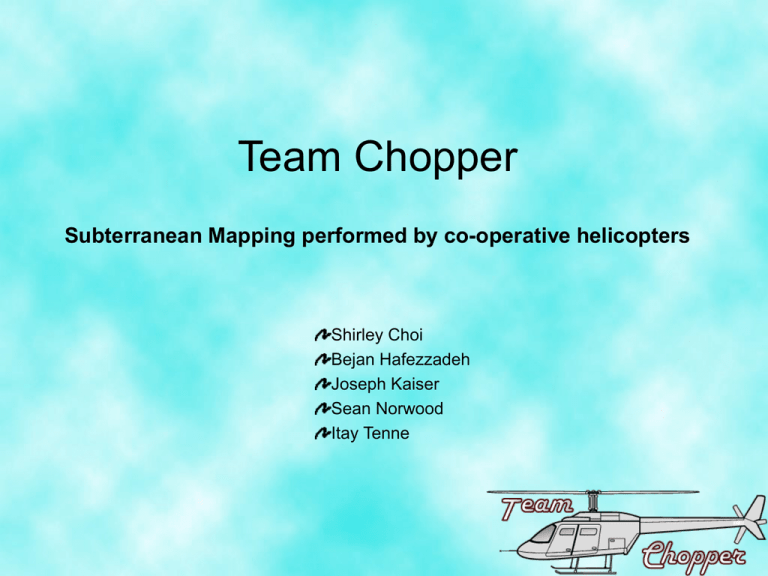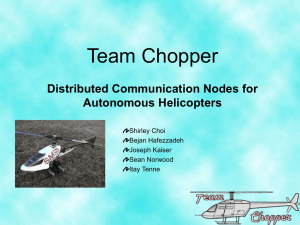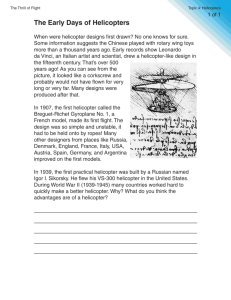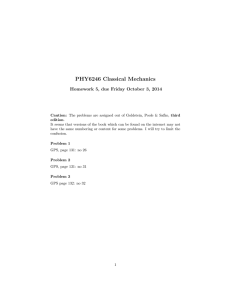(298 kB PowerPoint)
advertisement

Team Chopper Subterranean Mapping performed by co-operative helicopters Shirley Choi Bejan Hafezzadeh Joseph Kaiser Sean Norwood Itay Tenne Introduction • Subterranean Mapping • Autonomous Cooperative Helicopters • Avionics System • Can Avionics Interface Board (CAIN) System Overview Satellites INS Flight Computer RS232 Interface Board IMU Pressure Sensors GPS RS644 RS232 RS232 Interface Board Interface Board Magnetometer RS232 Interface Board Interface Board Power Generator Power Board CAN Multi-Drop Bus All Boards Interface Board Interface Board Interface Board Servo Isolation RS232 On board Radio RS232 Servo battery PWM signals Servos RC receiver For test and debug Host PC for COM and configuration Ground Radio RC Transmitter USB To GPS Multi-Drop Bus Error Correcting GPS Helicopter’s On-board Devices • • • • • • CAIN Boards 586-Engine-P (Flight computer) Servos IMU RC receiver GPS CAIN BOARD • Chopper Avionic Interface Node • Interfaces between the CAN bus and the individual devices. • Built around an Atmel Processor • Contains UARTs(RS-232), PWM generators, Digital Output and Inputs • Individually programmable CAIN Board Block Layout TWI/SPI ADC addr ISP JTAG Addr/data RS232 RS232 CAN transceiver / CAN bus NV RAM Atmel RS644 AT90CAN128 EEPPOM LEDs PWM (6 channels) Jumpers/Selectors 586-Engine-P • • • • Main processing unit for the helicopter Based around an AMD 586 processor On board CF memory card reader Will read the sensor inputs from on-board devices and RC controller and send corrected signals to the servos • Will include the control law to perform the augmented control on the helicopter Servo • A servo is used to mechanically control the helicopter • It is controlled by PWM signals produced by errorcorrected signals from the remote-controller unit IMU • An Inertial Measurement Unit gives 6 key measurements of the helicopter • These measurements are sent to the flight computer via the CAN bus • The flight computer processes this information for error correction RC receiver • A remote controller (RC) is used to control the orientation of the helicopter • The RC receiver receives human input signal • Signal decoded through CAIN board – Sent to servos for full manual control – Or, dispatched on CAN bus to be processed by augmented control system GPS • GPS unit on helicopter provides flight computer with latitude, longitude, and altitude measurements • The GPS used for fully autonomous flight Risk Analysis • Power consumption on board • Control loop (simulation) • Noise – EMI, Cross-Talk, ESD • Physical vibration • Time delay (transmission) Contingency Plan • • • • • Shopping cart Powered by batteries No control loop (manually driven) PCBs spaced out – less noise Minimized physical vibration Part List Provided by Prof. Meyer: Parts quantity Parts quantity Total Cost Chopper 1 RC helicopter 1 $500.00 Digital Servos 1 AT90CAN128 6 $100.00 586-Engine-P 1 CAN Transceiver 6 $11.00 EEPROM 4 $40.00 SRAM 4 $16.00 12 MHz oscillator 4 $16.00 R/C components / $100.00 6 layer PCB Fabrication (4 boards) / $730.00 PCB population (4 boards) / $560.00 Flight box 1 $300.00 GPS 1 STK500 development board 2 RC receiver 1 Shopping Cart 1 12V battery 2 Total: $2373 Schedule Future Development • CAIN is versatile, it is capable of interfacing with unknown devices. • More modules – Pressure sensor – Magnetometer … etc • • • • pre-filtering data on CAIN Development of the multi-master model Implement advance control system Path finding ability



